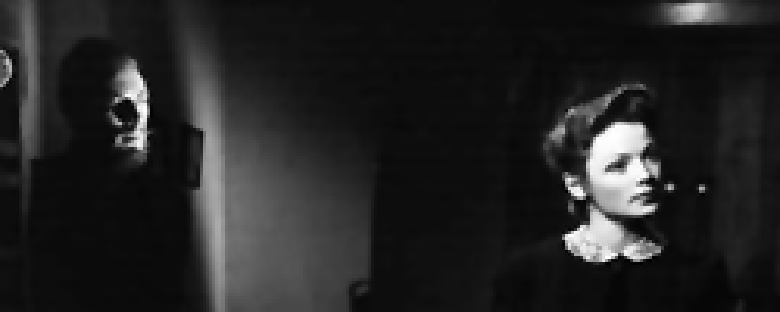Reviews
Joseph L. Mankiewicz
USA, 1947
Credits
Review by Matt Bailey
Posted on 11 July 2004
Source Fox Studio Classics DVD
Lucy Muir (Gene Tierney), a headstrong young widow chafing under the confines of living with her late husband’s family, rents a seaside cottage that turns out to be haunted by the irascible ghost of a sea captain (Rex Harrison). The ghost of Captain Gregg tries to scare Lucy out of the house but quickly comes to admire her spunk (as well as her great beauty), and they agree to try to live together. When Lucy loses her income, Gregg’s ghost has the idea to turn his life story into a racy and sensational book, transcribed, naturally, by the prim Mrs. Muir. Ghostwriting, indeed. The book is a success. Lucy, a little tired of spending all her time with a dead man, begins to fall for the smooth advances of Miles Fairley, an oily cad who practically oozes cynicism (and who is also a beloved children’s author). At first, Gregg attempts to warn Lucy against Fairley, but when he realizes that he can no longer interfere with Lucy’s life among the living, he vanishes and suggests to Lucy as she sleeps that he was nothing more than a dream. Soon, Lucy’s heart is broken when she learns that Fairley is married and that she was only one more in a string of infidelities. Lucy retires to her cottage where she grows old in her loneliness and dies. At her death, Gregg comes to retrieve Lucy’s spirit and they are reunited in the afterlife for all time.
Despite being a fan of the film work of Joseph L. Mankiewicz, it took me a long time to see this film. Perhaps I was scared off by the presence of Rex Harrison, whom I’ve never particularly cared for, or perhaps I thought it would disappoint. I’m glad to say that I wish I had seen it sooner. Harrison’s role is little different from his arrogant paternal figure in My Fair Lady, but it’s this type of role that suits his limited talents best. Gene Tierney is often best used as a foil for men’s attractions to her, such as in Laura where she is the object, presumed dead, of Dana Andrews” morbid obsessions, or in Lubitsch’s Heaven Can Wait, in which she plays the wife of a man returned from the dead to prove that he was loved (a similar role to her character in Mrs. Muir). Here, she plays a strikingly independent woman but, at the same time, is able to convey the isolation that lies behind independence.
While a product of the Hollywood studio system, the film is a remarkable piece of thoughtful moviemaking for adults. The script, based on the book by R.A. Dick (a pseudonym for a woman whose father was a real sea captain), is exceptionally intelligent and literary and Mankiewicz’s direction is sensitive and assured. The film begins as a quirky, lightly comedic romance in the same small but distinctive category of supernaturally tinged romances that includes I Married a Witch and Bell, Book and Candle. It slowly and carefully evolves into an unexpectedly moving drama with a transcendent finish. I was, in every way but one, surprised by the classiness of this production. The only thing that wasn’t a surprise was the beautiful score by Bernard Herrmann. I have yet to come across a Herrmann score that was not a perfect match for the film it accompanies, yet does not overpower it or attempt to take attention away from the drama. The score for The Ghost and Mrs. Muir is no exception. It is romantic in both the musical and emotional senses of the word and is truly evocative of the emotions surging under the placid visage of Lucy Muir and of the lonely, wind-swept seaside setting.
Largely ignored at the time of its release (except for an Academy Award nomination for cinematography), the film has gained in reputation over the years, but is still not regarded as a classic of its time. Adding insult to injury, twenty years after the film was made, it was adapted into a very strange and dispassionate family-oriented television series (featuring Hope Lange and Charles Nelson Reilly) that had very little to do with the original source material and an awful lot to do with ripping off Bewitched. It lasted two seasons on two different networks before it was, mercifully, put out of its misery. Reilly moved on to a decade of Match Game and became one of the childhood role models (along with Snagglepuss, Paul Lynde, and Don Knotts) of yours truly.
We don’t do comments anymore, but you may contact us here or find us on Twitter or Facebook.



